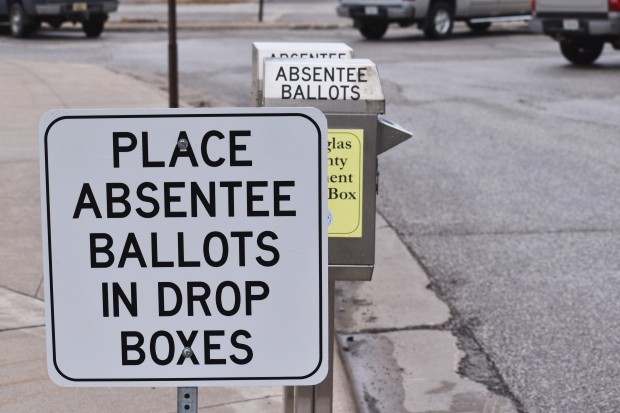Liberal Justices Question State Supreme Court’s Ban on Ballot Drop Boxes
Lawsuit by voter mobilization group Priorities USA seeks to overturn 2022 ruling.

Superior had a drop box for absentee ballots outside the city’s government center polling location in 2020. Danielle Kaeding/WPR
The Wisconsin Supreme Court’s liberal majority voiced strong skepticism Monday about a 2022 ruling from the court’s former conservative majority, which led to a near-total ban on absentee ballot drop boxes.
Conservative justices, who are now in the minority, defended their ruling, with one insinuating their liberal colleagues are considering overturning the decision because they’re acting like a “super legislature.”
The voter mobilization group Priorities U.S.A., the Wisconsin Elections Commission and Democratic Gov. Tony Evers are asking justices to overturn the court’s 2022 decision, which states that because state law doesn’t explicitly allow for drop boxes, local clerks can’t use them. Those parties claim conservative justices got it wrong two years ago and the prior ruling made voting harder.
The Republican-controlled Wisconsin Legislature, which intervened in the current case, argues the 2022 decision should not be overturned simply because the court’s majority has shifted.
The use of absentee ballot drop boxes exploded during the 2020 presidential election, as voters heeded warnings to avoid public places during the COVID-19 pandemic. By spring of 2021, there were 570 drop boxes spread across 66 of Wisconsin’s 72 counties, according to the WEC.
During oral arguments Monday, conservative justices grilled attorneys for Priorities U.S.A, the elections commission and the governor. Justice Rebecca Bradley, who wrote the 2022 opinion that banned nearly all absentee ballot drop boxes, said the Supreme Court doesn’t exist to provide elections guidance.
“We declare what the law says. That’s it,” Bradley said after reiterating drop boxes aren’t mentioned in state laws laying out how clerks administer elections.
Attorney David Fox, who is representing Priorities U.S.A, argued the decision two years ago resulted in more absentee ballots being thrown out and led to confusion about whether any type of drop box is allowed. He said some clerks are still using slots in their offices where voters can submit completed absentee ballots. Fox also said state law gives clerks broad authority to run elections and the court’s drop box decision has been used to challenge other election practices “not expressly authorized” in statute, which he called “an enormous problem.”
The court’s conservatives disagreed and questioned why the case was filed last November, after the body flipped to a liberal majority. They also asked whether there should be any limits on how clerks can use drop boxes in the future.
“As I understand your argument,” Bradley said to Fox, “you are asking this court to become a super legislature and give free rein — despite what the statutes say — give free rein to municipal clerks to conduct elections, however they see fit. That, counsel, seems to me to be the greater danger to democracy, because you’re asking this court to override what the Legislature wrote.”
Attorney Misha Tseytlin, who is representing the Legislature, argued that the issue has already been decided by the Supreme Court and should not be reconsidered. He said the legal principle called stare decisis demands a past precedent should not be overruled unless there are substantial new facts after a case is settled, which hasn’t happened with regard to drop boxes.
Before Tseytlin finished his opening remarks, liberal Justice Jill Karofsky mentioned that U.S. Supreme Court Justice Samuel Alito argued that stare decisis doesn’t compel courts to follow precedent when they feel it was “egregiously wrong from the start” before that court overturned federal abortion protections in 2022. She suggested that principle could apply to the Wisconsin Supreme Court’s 2022 drop box ruling, known as the Teigen decision.
“What are we to do here if we believe that Teigen was egregiously wrong from the start, that its reasoning was exceptionally weak, and that the decision has had damaging consequences?” Karofsky said.
Tseytlin responded by saying there hasn’t been any problems administering elections since the 2022 decision and a “reasonable disagreement” between the justices on the court’s earlier ruling isn’t enough to warrant overturning precedent.
Liberal justices also brought up a letter Tseytlin sent to the Dane County Clerk in 2020 when he was representing Republican Wisconsin Assembly Speaker Robin Vos and former Republican State Senate Majority Leader Scott Fitzgerald. In that letter, Tseytlin stated that drop boxes were “wholeheartedly” supported and “expressly authorized” by the Legislature.
Liberal Justice Rebecca Dallet asked why the Tseytlin and the Legislature have reversed their position.
“Generally, your honor, when one hears new arguments and learns new analysis, one doesn’t just say I’m not changing my mind,” Tseytlin said. “At that point, no one even criticized drop boxes legality at that point.”
He said once the ballot drop boxes were challenged in the case that led to the Teigen decision, facts were developed and arguments were heard. Tseytlin said the court’s former conservative majority gave an authoritative interpretation of state statute and he’s not aware of any other scenario of a court doing that without new facts coming to light.
“I understand that there was very strong disagreement in Teigen about drop boxes,” Tseytlin said. “I think that the principle of stare decisis is too valuable to cash out for drop boxes.”
Tseytlin said if the 2022 ballot box ruling is overturned now, the issue will be back in court anytime the court’s majority shifts in the future.
Liberal justices question Wisconsin Supreme Court ruling banning most ballot drop boxes was originally published by Wisconsin Public Radio.
If you think stories like this are important, become a member of Urban Milwaukee and help support real, independent journalism. Plus you get some cool added benefits.




















